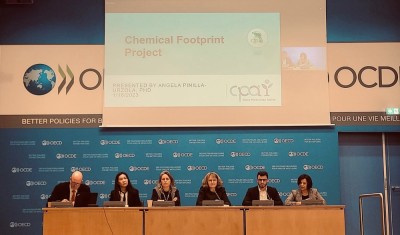
Last month, Dr Angela Pinilla, Program Manager of Clean Production Action’s (CPA) Chemical Footprint Project traveled to Paris to present the results of the 6th Chemical Footprint Project (CFP) Report to international policy experts on chemicals and waste management. The CFP is the first-of-its-kind initiative to measure chemical footprints and assess business progress away from hazardous chemicals to safer solutions.
The multi-stakeholder workshop was in support of the Strategic Approach and sound management of chemicals and waste beyond 2020 (“Beyond 2020”) and was hosted by the OECD and the United Nations Inter-Organization Programme for the Sound Management of Chemicals, 18-19 January, 2023. The goal of this and related workshops is for chemical intensive economic sectors to develop “sustainable chemical and waste management strategies…which identify priority chemicals of concern [as well as] standards and measures to reduce chemical input and footprint along the value chains”.
“Chemical footprint reduction is not only achievable but it’s happening”, Angela explained as she highlighted the chemical footprint reductions achieved by leading corporations, documented in the report. “This conclusion really caught the attention of the participants in the room”, she added.
As Angela explained in her presentation, companies need to reduce their chemical footprint by quantifying the total mass of chemicals of high concern used in their value chain and then setting reduction goals. Without such goal setting companies cannot demonstrate progress to safer chemicals adoption. The good news is that this is now happening.
Companies with over $1 trillion in annual revenue from seven business sectors who took part in the 6th CFP Survey, collectively reported chemical footprint reductions of 83.4 million pounds/37.8 million kilograms over one year. As the report findings further reveal, companies that repeatedly participate in the CFP Survey continue to improve their score and demonstrate they can indeed significantly reduce their use of hazardous chemicals. Based on these results, CPA is now encouraging businesses to set chemical footprint reduction goals of at least 50% by 2030 and zero by 2040.
Investors are a major push for corporations to reduce their chemical footprint, explained Alexandra McPherson, Director of CPA’s Investor Environmental Health Network who took part via zoom link. “The chemical industry is expected to grow from $5 trillion in 2017 to $10 trillion in 2030 and it is essential that the financial community mobilizes support for new 2030 targets to reduce chemical footprints, eliminate highly hazardous pesticides and build clean circular, low carbon economies,” she emphasized.
A key outcome of this Paris workshop highlighted that “Chemical footprint assessments and performance reviews help to measure industry performance, foster performance improvement, and guide investors. Existing initiatives could be scaled-up and opportunities for alignment be explored.”
Workshop outcomes will feed into the Fifth International Conference on Chemicals Management in Bonn, Germany (Sept. 2023). CPA intends to keep pushing the feasibility of chemical footprint reductions and is committed to advancing solution-based strategies for safer chemicals implementation.


